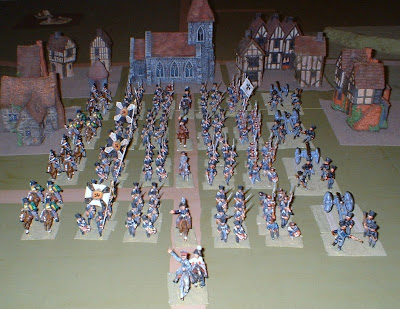There are three campaign areas in Germany:
North - Second French Army v Prussian Army
Centre - First French Army v Russian Army
South - Third Bavarian Army v Austrians
NORTH GERMANY AT START OF CAMPAIGN
North - Second French Army v Prussian Army
Centre - First French Army v Russian Army
South - Third Bavarian Army v Austrians
NORTH GERMANY AT START OF CAMPAIGN
Northern Germany is the setting for the Magdeburg Campaign.
Start positions as follows:
4 French –
5 French –
6 French –
13 Polish –
1 Prussian –
2 Prussian –
3 Prussian –
4 Prussian –
SECOND FRENCH ARMY

At first light on the morning of 1 May 1813 Marshal Davout, commander in chief of Second French Army, met with his corps commanders in the north German city of Hannover. The previous night he had received a despatch from Napoleon confirming that Prussia had declared war on France.
Davout was responsible for holding the line of the river Elbe from Hamburg to Madgeburg as part of Napoleons overall strategic plan for 1813. This plan envisaged that Napoleon would lead the First French Army against the Russians at Dresden, whilst Davout held the Prussians in check at the river Elbe. When the Russian army was destroyed both French armies would advance on Berlin and finish the war. However it would be at least two weeks before First French Army was ready to move.
Napoleon was well aware that the greatest threat came from Prussia. He therefore allocated his best troops to Davout, who was tasked to hold the Prussians in check. Davout had deployed his two best corps to the defence of the river line.
4 French corps was based at Hamburg, and 5 French corps at Madgeburg. He was confident that he could hold both cities, but there was 80 miles of undefended river between them, and the Prussians could choose where to pass.
13 Polish corps was at Brunswick. It had suffered badly in the Russian campaign of the previous year, and was held in reserve until it could be reorganised and reinforced. This task had just been completed, and it was ready to march.
6 French corps was destroyed in Russia. It was now up to strength, but consisted of a lot of conscripts. It was undergoing frantic training at Hannover, which is the reason Davout had set his headquarters there.
Davout now issued orders for 5 corps to hold Madgeburg at all costs, to patrol north and west of the city and to report any Prussian movement without delay. 6 and 13 corps were ordered to march on Madgeburg. 4 corps was ordered to move down the river Elbe towards Madgeburg, but to keep watch on the west bank and to report any enemy movement towards Hamburg.
Davout was confident that he had done all he could. If the Prussians moved quickly he could not stop them crossing the river, but with luck he could contain them between Hamburg and Madgeburg. He was fully aware that if he failed to do so there was nothing else to stop them reaching Paris.
PRUSSIAN ARMY
110 miles east of Hannover, Prince Blucher reviewed the Prussian army at Potsdam just outside the city of Berlin. Although nominal allies of Napoleon during the Russian campaign, the Prussian army had taken care not to get involved in any serious fighting. The four corps which formed the army were therefore in excellent shape and ready to fight.
For the past month Blucher had urged the King to declare war on France. He was well aware that the French army had ceased to exist during the terrible retreat. Had Prussia immediately marched on France he was confident they would have had an easy victory. However the King had hesitated, and wanted reassurance that the Russian army would join them. Both knew it would still be weeks before that could happen, as the Russians had suffered almost as much as the French during the retreat.
Blucher was therefore delighted to be told that war would be declared on 1 May 1813. He was ready. His army was ready. He finished his review and gave the order to march on Madgeburg and destroy the French.



